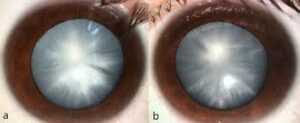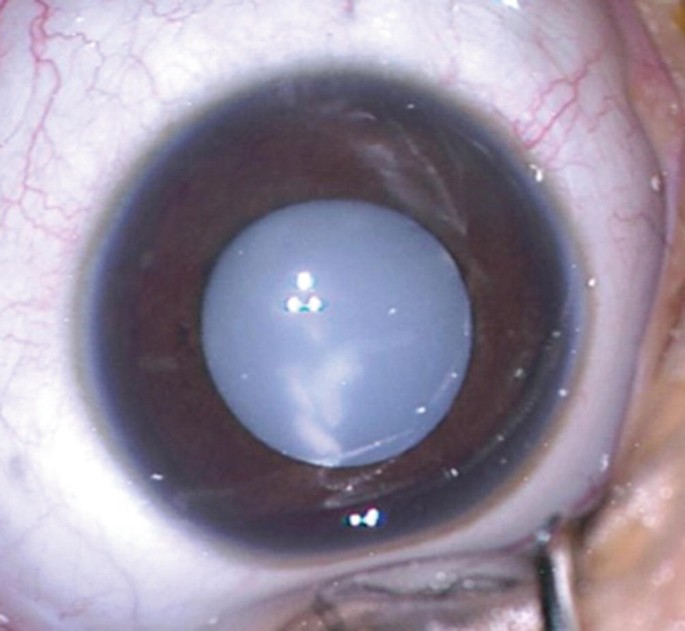Have you ever heard of metabolic cataracts? These are a form of eye disorder that can cause vision loss and affect your quality of life. In this article, we’ll break down what exactly metabolic cataracts are, the symptoms to look out for, and the best treatments available. Read on to learn more about this condition and how it can be managed!
Contents
What is a Metabolic Cataract?

A metabolic cataract is a type of cataract that is caused by a build-up of metabolic products in the lens of the eye. This can be caused by a number of different conditions, including diabetes, obesity, and certain types of genetic disorders. Treatment for metabolic cataracts typically involves surgery to remove the affected lens and replace it with an artificial one.
As well as the already recognized metabolic diseases associated with cataract formation, such as galactosemia, galactokinase deficiency, Lowe’s syndrome, and diabetes, several other disorders may also cause cataracts to develop.
A number of metabolic disorders of genetic origin affect the anterior portion of the eye, including metabolic keratopathy. As a result of abnormal storage of metabolic substances, such as proteins, carbohydrates, and lipids, many corneal manifestations of the systemic disease result in changes in corneal clarity and function.
A metabolic cataract is an injury to the nuclear or lenticular fibers caused by an underlying metabolic disorder. One presentation of this condition may be isolated, while others may be part of a particular syndrome. The majority of metabolic cataracts are part of a congenital syndrome, but there is little information on its incidence. If children have bilateral cataracts screening for metabolic disorders can help us catch them early and treat them faster.
What are the Symptoms of Metabolic Cataracts?
Metabolic cataracts are a type of cataract that is caused by changes in metabolism. The most common symptom of metabolic cataracts is blurry vision. Other symptoms can include:
- The vision is worse in bright light
- Glare around lights
- Poor night vision
- Yellowing of the eyes
- Whites of the eyes that look cloudy or opaque
If you think you might have a metabolic cataract, it’s important to see an eye doctor for a proper diagnosis. Metabolic cataracts can be treated with surgery to remove the clouded lens and replace it with an artificial one.
Visit here- Free Cataract Surgery
Causes and Risk Factors of Metabolic Cataracts
A metabolic cataract is a type of cataract that is caused by an imbalance in the metabolism of proteins in the eye. This imbalance can be caused by a number of factors, including diabetes, aging, and certain medications. Metabolic cataracts are typically more difficult to treat than other types of cataracts, and they may require surgery to remove the affected lens.
The most common cause of metabolic cataract is diabetes. Diabetes can cause changes in the levels of sugar and fat in the blood, which can lead to an imbalance in the metabolism of proteins in the eye. Age is another risk factor for metabolic cataracts. As we age, our bodies become less efficient at metabolizing proteins, which can lead to an accumulation of abnormal proteins in the eye. Certain medications can also cause an imbalance in protein metabolism and lead to metabolic cataracts.
Consumption of coffee and alcohol, along with other lifestyle habits, such as smoking cigarettes, has been associated in observational studies with a higher risk for age-related cataracts. While this pattern has been suggested by these reports, it is hard to know for sure if these habits cause eye conditions because there may be factors that still aren’t known or accounted for in the studies. This lack of understanding about how these factors interact means we are not able to plan treatments that may help us decrease our risk for senile cataracts. However, a review of how these observed associations could be rooted in causation may provide clues as to how we might reduce our risk of developing the condition.
Diagnosis and Treatment Options
If you have been diagnosed with metabolic cataracts, there are a few treatment options available to you. Your doctor will likely recommend surgery to remove the cataract and replace it with an artificial lens. In some cases, laser surgery may be used instead of traditional surgery. If your cataract is not causing any vision problems, you may not need treatment.
Your doctor may also suggest using eye drops or taking nutrition supplements to improve the health of your eye and reduce the risk of further damage. In addition, if you have any underlying medical conditions that may be contributing to the cataract, such as diabetes or high blood pressure, your doctor will work with you to manage these conditions.
In newly diagnosed insulin-dependent diabetes, metabolic cataracts can occur, but they are rare
A child with prolonged poor control or presenting with prolonged symptoms before diagnosis is more likely to develop metabolic cataracts
It is important to examine the lens of the eye in all newly diagnosed cases of insulin-dependent diabetes, especially those with blurred vision, in order to diagnose cataracts early on
Specialist ophthalmologists should be consulted if lens opacities are suspected, and surgery may be recommended if needed.
Prevention of Metabolic Cataracts
Metabolic cataracts are a type of cataract that is caused by an imbalance in the metabolism of fats and carbohydrates in the lens of the eye. This imbalance can be caused by diabetes, high blood pressure, or other disorders that affect metabolism. Metabolic cataracts can be prevented by maintaining a healthy diet and keeping blood sugar levels under control.
In addition to these treatments, it is important to make sure you get regular eye examinations and wear protective eyewear when necessary. This can help prevent the cataract from worsening or developing in other eyes. Finally, if your cataract progresses and causes severe vision impairment, a cornea transplant may be necessary.
The best way to prevent metabolic cataracts is by controlling your blood sugar levels via diet and exercise. Additionally, regular exercise helps keep your body healthy and can also reduce the risk of developing metabolic cataracts.
Additionally, maintaining good overall health can go a long way in helping to prevent metabolic cataracts. This includes avoiding smoking, managing stress levels, and controlling blood pressure. It is also important to wear sunglasses when outside in order to protect the eyes from UV rays that can contribute to cataract formation. Finally, be sure to get regular eye exams with an ophthalmologist or optometrist so that any changes or problems with your vision can be detected early on.
Conclusion
A metabolic cataract is a rare eye condition that can cause significant vision loss if not treated. While there are currently no cures or treatments to reverse the damage, early diagnosis and intervention can help slow the progression of the disease and improve your quality of life. It’s important to have regular eye exams and follow up with an ophthalmologist if you experience any changes in vision. With proper monitoring and treatment, it is possible to manage metabolic cataracts and prevent further vision loss.
In rare cases, metabolic cataracts can be surgically removed. However, surgery carries its own risks and may not restore all of your vision. As there is currently no cure for metabolic cataracts, prevention is key. Eating a balanced diet that includes plenty of fruits, vegetables, and fiber can help keep your eyes healthy. Reduce your risk of developing the condition. Additionally, if you have diabetes or other metabolic disorders. It’s important to manage them carefully to help reduce the possibility of developing metabolic cataracts.
Cataract surgery is a safe and painless procedure. At MantraCare we have a team of experienced eye surgeons, who will be happy to answer any questions on cataract surgery. We provide effective cataract surgery in Delhi. Call us at +91-9711116605 for any inquiries.
